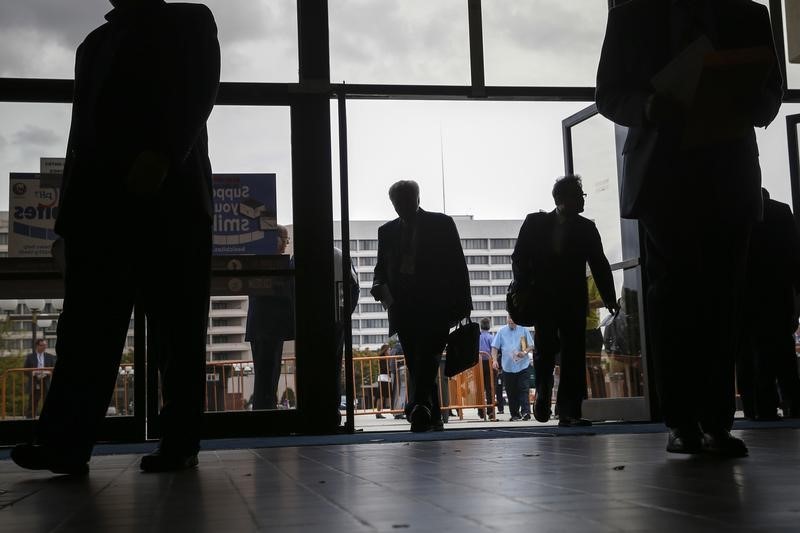(This story has accompanying pictures. Repeats to add PIX to slug for media clients)
* U.S. top overseas destination for Iranian students
* Many see American education as path to better life
* Trump order bans travellers from Iran, six other nations
* Students fear they won't be able to study or work in U.S.
By Bozorgmehr Sharafedin
DUBAI, Jan 30 (Reuters) - The new U.S. immigration curbs have cast uncertainty over the futures of thousands of Iranian students in the United States, with many losing hope of being able to finish their studies or find a job in the country.
President Donald Trump's executive order bans travellers from seven Muslim-majority countries including Iran for three months, and there is little certainty of what will happen after that.
Many of the students have spent their families' life savings to pay for an American higher education, which they hope will be a ticket to a well-paid job in the West or Iran.
Now they fear if they leave the country, they will not be allowed back in. They also do not know what status they will have after the three months are up, and whether they will be allowed to study, live or work in the United States.
Amin Amouhadi, 32, studies at the University of Georgia. His girlfriend, who is also Iranian, is about to finish her PhD in Canada.
"We were planning to get married in a month and move in together but the current ban and its possible consequences have put the future of all our plans in jeopardy," he told Reuters.
"I might quit my PhD program, (and) try to find a university in Canada to apply for. I can't think of any other plan."
The United States is the most popular destination for Iranians studying abroad, despite decades of hostility between the two countries. The trend goes right to the top; Iranian President Hassan Rouhani's cabinet boasts more U.S. doctorates than did the cabinet of Trump's predecessor Barack Obama.
About 8,700 Iranian students were at U.S. universities in 2014, a fifth of the estimated 50,000 Iranians studying abroad, according to the Washington Institute for Near East Policy.
More than 3,000 Iranian students have received PhDs from American universities in the past three years, over 7,000 U.S. academics including 40 Nobel Laureates said in a petition against the order signed by Trump on Friday. They said the ban could lead to the departure of many talented individuals.
'INHUMANE ORDER'
Mohammadreza Jalaeipour, a post-doctorate student at Harvard University, has cancelled a study visit to Oxford University in Britain because he was afraid he would not be able to return.
The 34-year-old said he was not hopeful of extending his studies in another American university or receiving a visa for a job in the United States.
"This discriminatory and inhumane order is targeted to harm Iranian society. It shows that the U.S. government is dishonest when it says they have no problem with the Iranian people and they are only against the Iranian government," he said.
Medical students could be among the hardest hit.
Roozbeh Esfandiari is an Iranian who studied medicine in the United States before gaining a job as a researcher at Harris County psychiatric center in Houston.
He said U.S. medicine school qualifications could not be easily transferred to other countries, so it would be a major blow for Iranian graduates if they were unable to work in the United States after several years of study.
"This news (Trump's order) is a headache for Iranian doctors applying for residency," he said.
The Educational Commission for Foreign Medical Graduates said on its website that it was aware of the executive order and was evaluating the potential impact on international medical students and graduates.
ANXIETY, DEPRESSION
Even before Trump's order, the road to American higher education has always been a tough one for Iranians. Since there is no U.S. embassy in Iran, students must travel to embassies or consulates in other countries to apply, which can cost them thousands of dollars.
Student visas can take many months to secure. Because of security concerns, Iranians can face background stiff checks.
Zahra Razavi, a computer science student at the University of Rochester, said her husband had applied for a U.S. visa several times under the Obama administration, with no success. The Trump order has crushed their lingering hopes of living together in the United States, she added.
"This disaster has caused depression and deep anxiety in me. It's impossible to continue this way. I have no choice but to say goodbye to my dreams and quit my studies."
Shirin Sajadi, an Iranian psychotherapist in Boston, wants to help shell-shocked students from her homeland by offering them free psychotherapy sessions.
"There's a sense of facing crisis and the need to make sense of the chaos surrounding us," she told Reuters.
"Many immigrants have come to this country when they had nothing but hope for a better life. They've worked hard, played by the rules and hoped to succeed. But now that hope is gone." (Editing by William Maclean and Pravin Char)
